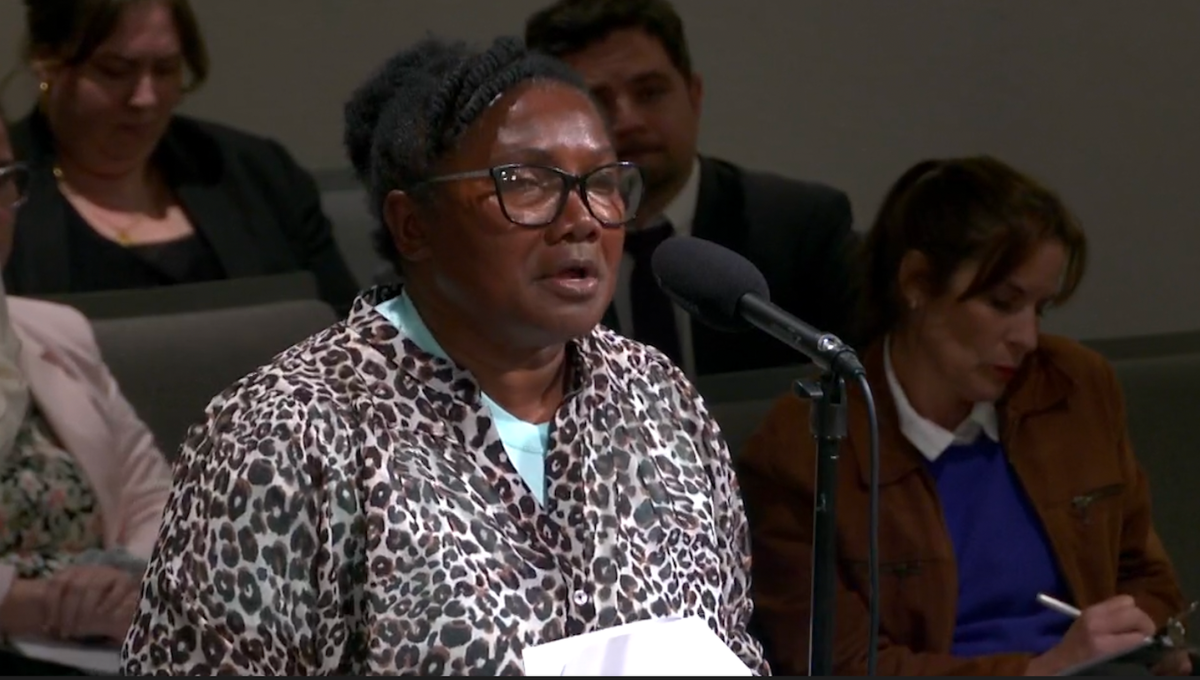Tech & Homelessness — Event Recap

Last Thursday, about 130 people gathered at Manny’s in San Francisco to talk about tech and homelessness.
Catherine Bracy, TechEquity’s Executive Director and Co-Founder, moderated the discussion. Panelists included: Jennifer Friedenbach, Executive Director of the Coalition on Homelessness; Dr. Kenneth Kim, Interim Senior Director of Programs of GLIDE;
Del Seymour, Founder of Code Tenderloin and Co-Chair of San Francisco’s Local Homeless Coordinating Board; and Jesus Castellon, Google Security Officer and service worker with SEIU-USWW.
Check out our twitter thread here:
Jennifer Friedenbach began the conversation by giving us a full picture of the current state of homelessness in the City. According to Friedenbach, San Francisco has experienced a massive surge in homelessness; with increases in San Francisco by 30% and Oakland by 50% over the past 2 years. Massive divestment from housing and bad policies going back 30 years have pushed people out of their homes faster than ever before.
Friedenbach said that the West Coast is feeling the crisis harder because of rising rents, gentrification, and displacement. While there have been an influx of higher-paying jobs, they haven’t been matched with middle- and lower-paying jobs. Friedenbach also stressed that the lack of tenant protections have specifically hurt disabled and Black and Brown communities the most.
She argued that there are a lot of myths out there about unhoused people. There is a common misconception that we have so many people living on the streets due to unhoused people from other cities coming to the Bay Area. Friedenbach crumbled that theory and declared that it is not true, citing that 69% of unhoused residents in San Francisco were originally living in apartments before being evicted or priced out. For many people, a single missed rent check could kick you to the curb.
The conditions forced onto our unhoused neighbors deteriorates people’s physical and mental health, making it even harder to escape homelessness. Friedenbach affirmed that this a situation we created — and one we can solve.
Dr. Ken Kim spoke to how GLIDE provides direct services to our homeless population. They provide 3 hot meals a day for 364 days a year. Their organization includes a center with free hygiene services, case management, ID services, navigation services for seniors, a women’s center, and comprehensive harm reduction program.
Dr. Kim shared that most folks — including many tech workers — come to volunteer through their meals program. Dr. Kim always hears that people see our homelessness crisis everyday, but don’t know how to engage. Through the meals program, volunteers get the chance to actually talk to people experiencing homlessness and better understand what people are going through, rather than judge only by what they see on the street.
Apart from the sharp increase in people losing their homes like Friedenbach mentioned earlier, Dr. Kim also noticed a rise in public health issues. One branch of GLIDE consists of a group of health professionals that do outreach at encampments. They are able to identify and treat people who are experiencing HIV and other diseases. However, Dr. Kim mentioned that it is difficult to engage with unhoused people and gain their trust, given how much they have been mistreated or turned away by our public health system.
After that trust has been built, Dr. Kim shared that it’s getting harder to find the same people again due to the City’s increased sweeps. The sweeps, which consist of SF police officers and city officials telling unhoused residents to move off the sidewalk, make it hard to find the people with whom GLIDE has built relationships because they have been forced to move. Dr. Kim said it’s also challenging to pick up someone’s case when all their paperwork and medication have been thrown out during a sweep.
Friedenbach underscored that cities are responding to our unhoused residents by utilizing police officers. She said that when you call a city about an unhoused person, the police is the primary responder. What happens is that police officers and other city officials then break up encampments and illegally confiscate property, like clothing, survival gear, medication, and family heirlooms. She argued that the city should treat our unhoused neighbors in a more humane way and provide them housing, instead of pushing people from block to block. Friedenbach mentioned the community-led Solutions Not Sweeps campaign, which is urging the City to replace the sweeps with actionable, care-based solutions
Del Seymour spoke about his work at Code Tenderloin, which helps unhoused people build skills and move into the tech industry. Seymour stated that he does not blame our unhoused population on the tech industry but instead on banks, developers and landlords. Without regulation, Seymour says that landlords and developers are acting out of greed, prioritizing their profits over the wellbeing and safety of other people.
He continued to say that tech workers are also paying high rents but are still blamed. Seymour reflected that San Francisco has had unhoused residents way before tech moved in. He shared that South of Market was all tents and cardboard, and that the Moscone Center used to be the largest encampment.
Seymour believes in connecting housed people (especially tech workers) with the unhoused community in the Tenderloin and beyond. That’s why he founded the Tenderloin Walking Tours, which has brought about 35,000 people in the past 11 years to the Tenderloin, an often overlooked neighborhood. Seymour shared that tech workers who have gone on his tours now actively participate in local service at organizations like GLIDE and St. Anthony’s. Seymour finished by praising tech for spending millions of dollars to help the 300+ nonprofit organizations located in the Tenderloin.
Jesus Castellon shared his story of the hardships he faces with housing in the Bay. Before getting a job at Google as a security officer, Castellon worked at In-N-Out from age 17–19. He described that a lot of his coworkers had been working there for years but their wages remained the same. Castellon said that his whole family is currently living in a mobile home and facing eviction in the near future. Some mobile homes even have 2 families living together. Castellon detailed that for many people he knows in the South Bay, they are working more than 40 hours, 6 days a week, and are still struggling to pay their skyrocketing rents.
He reflected that even as a kid, before tech companies came along, his family still had trouble with paying mortgage. Castellon concluded by saying that finding mentors in his life, including at Google, has pointed him in the right direction. He will be starting school soon and will pursue a computer science degree.
Jennifer Friedenbach gave the audience some hope by saying that there’s positive stuff going on and a lot of opportunity to affect change. Because there is such a high visibility of our unhoused neighbors, she suggested that we can now have political will to act.
A great example that Friedenbach brought up was her work with the Prop C (Our City Our Home) campaign which activated a lot of tech workers to advocate for their unhoused neighbors.
Friedenbach voiced that a lot of people didn’t relate to homelessness in the past, but now all renters are afraid and on the edge of losing housing; while this precarity is not wished upon anyone, it is making people empathize see themselves in the faces of homeless people like never before.
Friedenbach revealed that there are anti-homeless ballot measures have been and are actively demonizing and criminalizing unhoused people. Furthermore, Friedenbach brought up that there are 80 full time officers spending 100% of their time moving a person from one side of the street to the other, costing the city hundreds of thousands of dollars. She concluded saying that San Francisco is extremely affluent, and that, quite simply, we need to tax the rich to house the poor.
Dr. Kim recited the quote “The opposite of poverty is not wealth, it is justice”. The city is funding a lot of innovative solutions to address homelessness; however, many of these innovations are single-issue focused and do not address other intersectional issues affecting our unhoused residents, like racism and classism.
He spoke about having many meetings with tech companies and workers alike who have ideas on apps or other tech that can help. Often, Dr. Kim said these companies and workers leave these meetings not with a validated silver bullet solution, but rather a deeper understanding of the complexities that are inherent to the homelessness crisis.
Dr. Kim urged tech workers to go back and share with colleagues and friends how to better understand the crisis we are in and contribute to organizations working on solutions.
Del Seymour declared that the way we assess unhoused folks is very biased. He conveyed that people do not know who they are talking to and preconceived notions make them scared.
When asked how tech can do better, Seymour immediately responded urging that companies should hire locally! 50% of applicants should come from the zip code their office is located. The success of Code Tenderloin has shown that there is lots of local talent, but companies need to reach out more.
Seymour wants more tech workers to invest in at least one person! He advocated for using your tech skills and savvy to help an unhoused neighbor secure a job. He stressed that a paycheck can save someone’s life.
Seymour told the audience that he can take everything from you except a paycheck and you’ll be okay. However, if they take a paycheck away from you, you’ll be out on the street. Seymour implored that everyone in the room should sponsor someone.
The panel discussion showed us how complex the homelessness crisis really is. There are a lot of issues at play that require us to think about homelessness not only by what we see on the street everyday, but rather about the structural inequities that have forced our neighbors out onto the street. However, we know that tech workers can leverage their power to help our unhoused neighbors and advocate for policies that actually house people.
This was the first of our Tech and the City series at Manny’s. Keep an eye out for future events!
We’re uniting tech workers to create a more equitable economy. Join us!
We believe the tech industry, built on the internet — the most democratizing communications platform in human history — can and should contribute to broad-based economic growth that benefits everyone.





